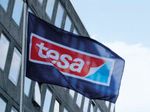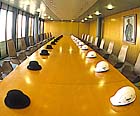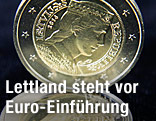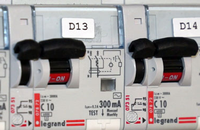 |
|
Welcome to issue no. 4 / 2013 of EWC News. 19 December 2013
|
|
The
Academy for European Works Councils (EWC Academy)
EWC
News appears four times a year.
You can find past issues in the newsletter archives.
|
|
1.
German government to strengthen European works councils
|
|
Coalition agreement includes clause on EWC and SE
In chapter 6 the coalition agreement describes the European political responsibility of Germany. The following passage can be found under the section "strengthening the social dimension":
It must be ensured that the basic social rights stemming from the European Union’s Charter of fundamental rights are guaranteed to be considered on an equal ranking with the market freedom within the European single market. The social dialog of bargaining partners plays an important role at the European level which should be further strengthened as well as the European works councils and participation in European companies.
The text is however a simple declaration of intent and does not contain anything concrete. In the past, today's coalition partners have had completely opposite opinions concerning both participation in European companies, i.e. with the transposition of the SE Directive, as well as with the revision of German legislation on European works councils.
Conflict in the transposition of the SE-Directive
The transposition of the SE Directive into German legislation was delayed and could only be completed in autumn 2004. Due to an objection from the German Bundesrat, the upper chamber, the legislative process dragged on longer than expected.
Conflict in the transposition of the EWC Directive
On 12 December 2013, in Vienna, the Social and Christian democrats agreed to continue the grand coalition which has existed since January 2007. Chapter 5 of the coalition agreement defines its European political goals. The paragraph entitled "securing wage and social standards" talks of:
Safeguarding employee participation rights as part of a stronger integration of the internal market, particularly by the establishment of new legal forms for European companies. There is no explicit reference to the strengthening of European works councils. However the Alpine Republic has already today the best transposition of the EWC Directive of all EU countries (see report in EWC News 1/2011). In Article 15, the Directive foresees a date which falls in the period of office of both newly agreed grand coalitions: No later than 5 June 2016, the Commission shall report to the European Parliament, the Council and the European Economic and Social Committee on the implementation of this Directive, making appropriate proposals where necessary.
A similar wording in the old Directive was the starting point of the 2009 revision.
The 4th edition of this reference book on the German Works Constitution Act has been released for the turn of the year 2013/14. An over 170-page appendix provides the detailed legislative and commented texts on the EWC and employee participation in the SE. The latest court decisions are also included e.g. the EWC of Visteon before the labour court in Cologne or the Donata Holding SE in Ludwigshafen (see report in EWC News 4/2012). |
|
2.
Current trends in the United Kingdom
|
|
Less rights for employees in transfer of undertakings
In the opinion of the present conservative-liberal government, the former Labour government had transposed the EU Directive in a far more employee-friendly manner than required by the EU. This "gold plating" on employee acquired rights is now to be taken off. According to the British trade union confederation TUC, the outsourcing of services such as cleaning, social care and canteens will become substantially easier in the future whereby primarily women and low wage-earners would have to fear the consequences. The change in legislation is part of a comprehensive package of labour legislation reforms from the British government. The consultation period for mass redundancies had already been reduced in April 2013 (see report in EWC News 2/2013).
The latest events concerning the Grangemouth refinery near Edinburgh, the largest plant of the Ineos group, are a prime example of management practice as it prevailed throughout continental Europe in the 19th century. Ineos, based in Switzerland, belongs to a British multi-billionaire who has been acquiring petrochemical companies from BP and other groups since 1998. The Grangemouth plant delivers 70% of the petrol to Scottish filling stations and makes up for 8% of the entire processing industry in Scotland. The workforce is strongly unionised.
The conflict began in summer 2013 when a full-time trade union representative (in Germany one would say "works council chairman") was accused by the employer of using part of his time for political work in the Labour party. As a result, his professional e-mails were examined by a company lawyer and he was suspended from office. In protest against this violation of the recognition agreement (which is the shop-floor framework agreement governing company employee representation), the trade union, Unite, organised a strike ballot. Since collective bargaining agreements are not legally binding in the United Kingdom, compliance can only be enforced by industrial action.
The real reason behind the escalation however, was a conflict on the company’s pension scheme which the employer wanted to terminate. Negotiations in collaboration with ACAS, the national arbitration board, were unsuccessful. The employer therefore proceeded with a lockout of the entire workforce on 16 October 2013 and threatened with a complete and permanent closure of the plant. He could only be persuaded otherwise after a modified collective agreement was accepted. Since the unhindered delivery of North Sea oil to Scotland was at stake, the Scottish government now also became involved in the conflict. The blackmail has paid off for the multi-billionaire: wages have been frozen for three years, the previous company pension scheme has been cancelled, a no-strike clause is in force for three years and there are no longer any full-time trade union representatives. The Scottish government will furthermore provide funds which will make the already very profitable plant even more profitable.
Campaign for participation in British boardrooms
Third EWC conference in London   The
annual EWC Academy conference took place already for the third time
running in London on 24 and 25 October 2013. Besides current
developments in labour legislation some outstanding activities were
presented by European works councils under British jurisdiction: DS
Smith, the packaging company (see report in
EWC News 1/2013) and the easyJet airline
(see report
in EWC News 3/2012). The EWC conference participants
came from Germany, the United Kingdom and four other countries.
|
|
3. Ryanair feels the headwind of labour legislation
|
|
French judges impose million euro fine
Ryanair also refused to establish company level employee representation according to French legislation and argued that all employees fell under Irish jurisdiction no matter where they worked. A French trade union filed a successful lawsuit against this and was able to convince the court on the applicability of French labour legislation. Ryanair has appealed against the verdict and will take the matter up to the European court of justice in Luxembourg if necessary. Belgium labour court has differing legal interpretation
On 4 November 2013 the industrial tribunal in Charleroi declined jurisdiction for legal proceedings filed by six former Ryanair employees. They were demanding compensation since Irish working conditions are below the legal minimum standards in Belgium. According to the court, although the plaintiffs were based at the Charleroi airport, their employment contracts did not come under Belgian jurisdiction. In the meantime there has also been an appeal against this ruling by a Belgian trade union.
A Norwegian court accepts jurisdiction
There has been a similar case previously in Norway. For the first time a former female employee plucked up the courage to take Ryanair to court. A court of appeal ruled on the unfair dismissal case on 21 August 2013. Since she was based in Norway, Norwegian and not Irish courts have jurisdiction. The airline has already appealed against the ruling in the highest Norwegian court of justice.
Ryanair’s unconventional HR policies also have repercussions back in the airline’s home country. There has been a pro-European grand coalition in power since 2011, which, in contrast with the United Kingdom, is striving to strengthen collective bargaining systems through legislative means. On 17 December 2013, the government passed a draft bill which, in the future, will force even companies like Ryanair into real collective bargaining. In February 2007 the airline had still been able to avoid this through legal tricks before the Supreme Court in Dublin (see report in EWC News 3/2007). Since this ruling, the Irish trade union confederation ICTU has been demanding a change in the legal framework for collective bargaining.
Apart from the "Ryanair case", an additional argument for the legislative initiative is the European Court of Justice ruling on human rights from April 2009 (see report in EWC News 2/2009). The right to collective bargaining and the freedom to strike were defined in this ruling against Turkey, as an integral part of the European Convention on Human Rights. In connection with this, there are currently also legal proceedings in Strasbourg against the Thatcher legislation (see report in EWC News 4/2012), which could possibly oblige the neighbouring country, Great Britain to make reforms. |
|
4. News from other countries
|
|
Letter-box companies ensure evasion from taxes and from employee participation
The Netherlands is a preferred location for foreign Holdings. Apart from tax evasion the avoidance of employee participation also plays a role here. By means of a small office or a "letter-box“ at the Amsterdam airport and as long as there are only a few employees in the Netherlands, any form of employee representation on the supervisory board can elegantly be avoided. Groups such as Ikea or EADS already use these methods.
There are approximately an additional 23,500 letter-box companies which are registered to save on taxes. Little or no taxes are levied on the licence fees which are necessary for a Holding to conduct any business under the brand name. It is perfectly legal for companies such as Google, Apple, Volkswagen or Deutsche Bahn to shift their profits there. Foreign companies can make special arrangements with the Dutch tax authorities which remain confidential.
Portuguese taxes trickle into the Dutch polders
The Amsterdam research institute, SOMO, published a review of Portuguese companies on 9 September 2013: 19 out of the 20 largest companies have shifted their tax-related activities to the Netherlands over the last few years. The OECD considers the Netherlands to be the biggest white-washer of Portuguese company taxes. The money is missing in the national budget which is currently being restructured with painful cutbacks in pensions, public employment and in the health service. While companies are transferring their money to the Netherlands, the Portuguese population is being asked to foot the bill. SOMO had already released a comprehensive evaluation on the same topic in June 2013 concerning eight corporations doing business worldwide.
 A EWC seminar is being organized in Doorn (near Utrecht) from 23 to 25 June 2014. This will include guidelines for the work of EWCs having Holdings in the Netherlands. The program is currently under preparation.
On 13 November 2013, 430,000 employees were called to elect their representatives on the works councils for the next five years. This was the last election under the old legislation since a reform of workplace representation is imminent. In the future works councils in Luxembourg are to have similar rights to German works councils (see report in EWC News 1/2013).
The lists of non-union independent candidates were able to increase their score by more than three percentage points and for the first time obtained more than 50% of the votes. The social-democrat oriented trade union umbrella organization, OGBL, obtained 29% and the Christian trade union Federation LCGB, 14% of the votes, both suffering slight losses. Banking and insurance represent a particularly important sector in Luxembourg with 12% of all jobs losses over the last five years. Aleba, the trade union of bank employees, clearly takes the lead here with more than 65% of the votes. OGBL remains the leading force in the steel and trade industries and in the health service.
Latvia becomes 18th Eurozone member
|
|
5. New European
works councils
|
|
Former
Siemens subsidiary establishes EWC
  On
17 September 2013 a EWC agreement was signed during a meeting in Vienna
for Unify. The company was spun-off from the Siemens group in 2006 as
Siemens Enterprise Communications (SEN) and was taken over by a U.S.
financial investor with a majority stake in 2008. The negotiations for
the establishment of a European works council started in autumn 2010
and were concluded successfully shortly before the end of the
three-year deadline. The EWC comes under German jurisdiction and
integrates the standards of information and consultation from the new
EU Directive. Its 19 members, including three from Germany, come from
17 EU countries and meet twice annually. The steering committee
consists of four members: two from Germany and one each from Austria
and Belgium. On
17 September 2013 a EWC agreement was signed during a meeting in Vienna
for Unify. The company was spun-off from the Siemens group in 2006 as
Siemens Enterprise Communications (SEN) and was taken over by a U.S.
financial investor with a majority stake in 2008. The negotiations for
the establishment of a European works council started in autumn 2010
and were concluded successfully shortly before the end of the
three-year deadline. The EWC comes under German jurisdiction and
integrates the standards of information and consultation from the new
EU Directive. Its 19 members, including three from Germany, come from
17 EU countries and meet twice annually. The steering committee
consists of four members: two from Germany and one each from Austria
and Belgium.
Jet petrol stations now with own EWC   A new EWC had to be established
following the spin-off of the downstream business (primarily petrol
stations) from the third largest U.S. oil company ConocoPhillips in May
2012 and the listing of the new company, Phillips 66 (named after the
famous route 66 in the USA) on the stock market. The agreement was
signed on 29 September 2013 on the basis of the new EU
Directive. It operates under British jurisdiction. A new EWC had to be established
following the spin-off of the downstream business (primarily petrol
stations) from the third largest U.S. oil company ConocoPhillips in May
2012 and the listing of the new company, Phillips 66 (named after the
famous route 66 in the USA) on the stock market. The agreement was
signed on 29 September 2013 on the basis of the new EU
Directive. It operates under British jurisdiction.The EWC is composed of representatives from five countries: the UK has three seats and Ireland, Germany, Austria and Belgium one each. The steering committee is made up of three delegates from three different countries. The EWC may invite up to three paid experts to every meeting. All other provisions are largely fashioned around the EWC agreement of the former parent company, ConocoPhillips, which has had an old voluntary agreement under Norwegian jurisdiction since 1996. Ninth EWC established in Spain   A EWC agreement was signed in
Madrid on 15 November 2013 for Prosegur, the security service provider.
The special negotiating body barely needed one year to complete the
draft text which is based on the new EU Directive. Both information and
consultation rights as well as training rights are state-of-the-art.
The EWC is composed of ten members: six from Spain, two from Portugal
and one each from France and Germany. A EWC agreement was signed in
Madrid on 15 November 2013 for Prosegur, the security service provider.
The special negotiating body barely needed one year to complete the
draft text which is based on the new EU Directive. Both information and
consultation rights as well as training rights are state-of-the-art.
The EWC is composed of ten members: six from Spain, two from Portugal
and one each from France and Germany.Spain still lags considerably behind in the establishment of European works councils. Up to now there are only EWCs in a further eight companies, the most recently was established in the infrastructure company Abertis in July 2012 (see report in EWC News 3/2012). |
|
6. Updated
EWC agreements
|
|
New distribution of seats after spin-off
It is now composed of 45 representatives (previously 65) who meet twice yearly. The twelve member steering committee (previously 14), including five French representatives from five different trade unions, meets every two months. There is also a reduction in the EWC budget (from 80,000 € to 62,000 € per annum) and in the number of visits possible to sites in other countries (from 35 to 25 per annum). The GdF Suez EWC agreement signed in May 2009 is regarded as one of the best in France (see report in EWC News 2/2009).
French electrical company adapts to new EWC Directive
The EWC is competent for transnational matters whenever at least 20 employees are concerned in at least two countries. Select committee members have the right to visit plants in other countries twice annually in the context of consultation procedures. An annual budget of 60,000 € is available for advisory services. A particularly weak point in the agreement is the provision of deadlines for information and consultation which are not forseen in the EU Directive. The EWC must render its opinion within 90 days. Central managment must respond to this within 15 days after which it may implement its plans unhindered.
 A new EWC agreement was signed at the German headquarters of Telefónica in Munich on 29 November 2013 (photo). It remains under British jurisdiction and covers subsidiaries in five countries (United Kingdom, Ireland, Germany, Czechia and Slovakia). The Spanish parent company is not involved since the EWC was established already in 2004 before the acquisition by Telefónica. The revision of the agreement was carried out over the last months with the technical support of the EWC Academy (see report in EWC News 1/2013). For British standards it includes very extensive provisions. A meeting took place in Hamburg on 21 and 22 November 2013 before the signing to discuss the implementation of the new standards of information and consultation. We have compiled a selection of EWC agreement texts on a website for download. |
|
7.
New
SE
participation agreements
|
|
SE conversion immediately following EWC constitution
On 18 June 2013, the special negotiating body signed a SE agreement which is largely based on the minimum standards of the German SE participation legislation. Nine EU countries are represented in the future SE works council, with an additional two representatives (from Switzerland and Serbia) without voting rights. Both the SE works council as well as the five-member steering committee meet twice annually. Central management commits not to implement any restructuring measures until the consultation procedure with the SE works council has been completely terminated. However there are provisions for deadlines which are not foreseen by SE legislation. The constitutional meeting is to take place on 15 January 2014. New SE works council complements existing EWC
Since the SE establishment is limited to one subsidiary and three countries, the RWE European works council continues to remain in office. It includes numerous representatives from Eastern Europe. It was established at the topmost Holding level in 2007 following the previous representation structure consisting of European divisional works councils (see report in EWC News 1/2008). RWE is therefore taking similar steps to BP, the British mineral oil group, who spun-off all filling stations and refining activities into a new SE under German jurisdiction in April 2010. However BP proceeded without the establishment of an independent SE works council and created a SE committee within the existing EWC (see report in EWC News 1/2010).
SE works council with worldwide competence
A SE agreement was signed for Inros-Lackner in Rostock on 24 October 2013. The architecture and property development company was founded in 2004 following the merger of several corporate groups from East and West Germany and is now expanding worldwide. The SE agreement which is valid for the European single market and Switzerland, nevertheless includes special provisions, with regard to branch offices in other parts of the world.
In exceptional circumstances which would normally result in a consultation procedure within the EU, the SE works council has a right to information. At present, apart from Russia this concerns a further five offices in Africa and two in Asia. Since there is no employee participation on the board of directors, central management is prepared to hold a meeting every two months with the SE works council before or after every board meeting. This resembles the provisions which were made, in December 2012, for the French IT group, Atos (see report in EWC News 1/2013). The special negotiating body of Inros-Lackner was advised by the EWC Academy.
|
|
8. Efforts towards correct consultation procedures
|
|
The actual background cause is central management’s plan to restructure. For the purposes of the consultation procedure the EWC established a working group and mandated the EWC Academy as expert. The plans are currently being reviewed in-depth as part of an economic assessment of the possible impact.
Forthcoming event
SE works council wants
to strengthen
consultation procedures
  The SE works council of tesa,
the adhesive manufacturer, held its 6 monthly plenary session in
Hamburg from 16 to 18 October 2013. The agenda included a better use of
information and consultation rights stemming from the SE participation
agreement concluded in 2008 (see report in
EWC News 4/2008). For this reason the EWC Academy
was requested to give a summary of other SE works council activities
and to point out possibilities for using the initiative rights for
cross-border negotiations. Further steps are to be developed in a
workshop in spring 2014 with support from the EWC Academy. The SE works council of tesa,
the adhesive manufacturer, held its 6 monthly plenary session in
Hamburg from 16 to 18 October 2013. The agenda included a better use of
information and consultation rights stemming from the SE participation
agreement concluded in 2008 (see report in
EWC News 4/2008). For this reason the EWC Academy
was requested to give a summary of other SE works council activities
and to point out possibilities for using the initiative rights for
cross-border negotiations. Further steps are to be developed in a
workshop in spring 2014 with support from the EWC Academy.Swiss electrical engineering
group develops flowchart
  ABB’s
European works council met in Regensdorf near Zurich from 5 to 8
November 2013. Following the adaptation of the EWC agreement to the new
EU standards in April 2013 (see report in EWC
News 3/2013), the 22 representatives from 17 countries now
want to optimize the consultation procedure according to the French
model. Several working groups have developed the key components of the
future EWC activity with technical support from the EWC
Academy. Following the example of Nielsen (see above), the
EWC select committee will continue to work on the establishment of a
flowchart. ABB’s
European works council met in Regensdorf near Zurich from 5 to 8
November 2013. Following the adaptation of the EWC agreement to the new
EU standards in April 2013 (see report in EWC
News 3/2013), the 22 representatives from 17 countries now
want to optimize the consultation procedure according to the French
model. Several working groups have developed the key components of the
future EWC activity with technical support from the EWC
Academy. Following the example of Nielsen (see above), the
EWC select committee will continue to work on the establishment of a
flowchart. |
|
9. The view
beyond Europe
|
| A French Dutch airline
strengthens social responsibility
Forthcoming event
A "Gender Equality Working Group" has been established between Unilever and two global trade union federations. This was announced on 9 October 2013. The working group has the goal of working out criteria for the promotion of women in all subsidiaries of the British Dutch consumer goods group as well as for the reduction of discrimination worldwide. The goal of a 50/50 gender balance has already been achieved in Australia. The Danone food group supports similar developments with its globally applicable antidiscrimination agreement signed in 2007 (see report in EWC News 4/2007). Blueprint for collective bargaining in China
|
|
10.
Interesting Websites
|
|
The European Foundation for the Improvement of Living and Working Conditions, a research agency of the EU based in Dublin, presents the developments in wage policies and earnings for every country since 1999 on its website. For every year the changes for all countries and some key industries can be consulted interactively on a colour coded map. The question of where branch level, centrally negotiated agreements prevail or where wage policy is fragmented at the company level, is also covered. The European Trade Union Institute (ETUI) in Brussels had also published its own graphical information on wage developments in the EU countries on its website in July 2013 (see report in EWC News 3/2013). European
projects and seminars on employee participation
 The European Centre for
Workers' Questions (EZA) in Königwinter near Bonn devotes
itself to international training from a Christian social perspective.
Seminars and EU sponsored projects are regularly held on employee
participation in Central and Eastern Europe or on the future of the
European social model. European works councils are also part of
EZA’s work. The European Centre for
Workers' Questions (EZA) in Königwinter near Bonn devotes
itself to international training from a Christian social perspective.
Seminars and EU sponsored projects are regularly held on employee
participation in Central and Eastern Europe or on the future of the
European social model. European works councils are also part of
EZA’s work.
Database of EU-specific vocabulary
European campaign for fair chocolate
We have arranged numerous further interesting websites into a collection of links.
|
|
11.
New publications
|
  Analysis
of branch-specific social dialogue Analysis
of branch-specific social dialogue
There have been institutionalized dialog forums in Brussels between trade unions, employers' federations and the European Commission for an exchange on socio-political questions since the middle of the 1980s. This "social dialog" was also introduced at the level of individual business sectors in 1998, with such committees currently present in over 40 sectors. This thesis published in July 2013 evaluates the results of social dialog and the actual consequences in the EU member states particularly in Germany, Denmark, and the United Kingdom. The electricity and the trade sectors are presented as prime examples. The book is only available in German.
Project report: Middle and senior level employees in EWC work   Eurocadres is the European
umbrella organisation for professional and managerial staff
representing over five million middle and senior level employees. As a
cross-industry federation for a certain professional category it is an
associated member of the European Trade Union Confederation (ETUC).
With financial support from the EU it has examined the specific role of
professional and managerial staff in EWC work. The project results have
been available since July 2013 in three languages. The booklet deals
with EWC agreements, the composition and functioning of European works
councils, the information and consultation procedure and the
coordination of EWC members among each other. Eurocadres is the European
umbrella organisation for professional and managerial staff
representing over five million middle and senior level employees. As a
cross-industry federation for a certain professional category it is an
associated member of the European Trade Union Confederation (ETUC).
With financial support from the EU it has examined the specific role of
professional and managerial staff in EWC work. The project results have
been available since July 2013 in three languages. The booklet deals
with EWC agreements, the composition and functioning of European works
councils, the information and consultation procedure and the
coordination of EWC members among each other.
These guidelines showing the possibilities for trade unions to influence decision making within the EU institutions were published in September 2013. The booklet describes the individual steps in the EU legislative process and concrete activities for trade unions based on examples such as the Port Package or REACH, the EU regulation on chemicals. The basic principles of online campaigns are also covered. The booklet is available in English and French.
Corporate Social Responsibility
We have collected further literature into a compilation of publications.
|
|
12. The EWC Academy: Further
examples of our work
|
|
U.S. avionics company strengthens EWC work   The EWC steering committee of Rockwell Collins met
in Paris on 7 and 8 October 2013. With the support of the EWC Academy,
it worked on the key points for the renegotiation of the EWC agreement
which had been decided in their plenary meeting held from 25 to 28
November 2013 in Toulouse. The signing is planned for spring 2014. The
EWC Academy delivered legal training on the handling of "confidential
information" in Toulouse and an experienced representative from another
EWC explained the possible methods for consultation procedures. The EWC steering committee of Rockwell Collins met
in Paris on 7 and 8 October 2013. With the support of the EWC Academy,
it worked on the key points for the renegotiation of the EWC agreement
which had been decided in their plenary meeting held from 25 to 28
November 2013 in Toulouse. The signing is planned for spring 2014. The
EWC Academy delivered legal training on the handling of "confidential
information" in Toulouse and an experienced representative from another
EWC explained the possible methods for consultation procedures.Space division of EADS faced with upheaval   The Astrium European Space Committee, a European
divisional works council under the EADS umbrella, represents 15,000
employees in the space sector in Germany, France, Spain, Great Britain
and the Netherlands. As previously the Airbus EWC (see report in
EWC News 4/2012) it met from 8 to 10 October 2013 in
the company’s training centre near Bordeaux. The EWC Academy
provided suggestions for the use of the new EU standards for
information and consultation. The Astrium European Space Committee, a European
divisional works council under the EADS umbrella, represents 15,000
employees in the space sector in Germany, France, Spain, Great Britain
and the Netherlands. As previously the Airbus EWC (see report in
EWC News 4/2012) it met from 8 to 10 October 2013 in
the company’s training centre near Bordeaux. The EWC Academy
provided suggestions for the use of the new EU standards for
information and consultation.Training on new EU standards   During Schibsted’s European works council
meeting held from 23 to 25 October 2013 in Brussels, the EWC Academy
delivered training on the consultation procedure as well as on the
definition and communication of "confidential information". The
Norwegian media group established its EWC in 2004. The 34 members from
eight countries meet twice annually. During Schibsted’s European works council
meeting held from 23 to 25 October 2013 in Brussels, the EWC Academy
delivered training on the consultation procedure as well as on the
definition and communication of "confidential information". The
Norwegian media group established its EWC in 2004. The 34 members from
eight countries meet twice annually.  Introduction
seminar at the Nivea manufacturer Beiersdorf Introduction
seminar at the Nivea manufacturer BeiersdorfEmployee representatives from the European Forum of the Beiersdorf cosmetics group met on 20 and 21 November 2013 in Hamburg. The EWC Academy delivered training, particularly focused on the basic knowledge of EU industrial relations’ systems and on the functioning of European works councils. Beiersdorf has a "voluntary" old agreement from the year 1996 which was last updated in March 2012. The European Forum is made up of one half each, employer and employee representatives. |
|
13.
Current Training Schedule
|
|
The EWC Academy and its
forerunner organization
have been organizing and delivering conferences and seminars for the
members of European works councils, SE works councils and Special
Negotiating Bodies since January 2009. So far 533 employee
representatives from 209 companies have taken part including many of
them for several times. This represents around 18% of all transnational
works council bodies in Europ – not yet including
the numerous in-house events of the EWC Academy.
6th Hamburg Conference for European and SE works councils   As every year a two-day
conference is being organised in Hamburg covering the following topics: As every year a two-day
conference is being organised in Hamburg covering the following topics:Monday, 27 January 2014: Current trends in the EWC landscape – how to consult properly? Tuesday,
28 January 2014: Visit to the Norsk Hydro aluminium plant
in Hamburg and discussion with EWC members
Language courses: Business English for German-spoken works council members The following dates are planned in 2014: from 27 to 30 January 2014 a language course will be held in Hamburg, an additional course from 6 to 12 July 2014 in the English seaside resort Eastbourne and from 12 to 18 October 2014 a language course near Dublin. German Dutch EWC seminar   A
German Dutch EWC seminar is being organized for the first time in Doorn
(near Utrecht) from 23 to 25 June 2014. It is specifically
aimed at works council members from companies A
German Dutch EWC seminar is being organized for the first time in Doorn
(near Utrecht) from 23 to 25 June 2014. It is specifically
aimed at works council members from companiesThe program is currently under preparation.   Employee representatives in U.S.
companies Employee representatives in U.S.
companiesA specialist conference is being held for U.S. company works council members for the second time on 30 June and 1 July 2014, this time in the America House Munich. Besides presentations from experts there will be the possibility for an exhange of experience on European works council activities and on the American management culture. Works council members from European companies with sites in the USA may also participate. Klaus Franz, the former EWC chairman of General Motors will moderate the conference. In-house events Please find a summary of possible topics for in-house events here: |
|
14. Imprint
|
|
EWC News is published by:
EWC Academy GmbH Rödingsmarkt
52, D-20459 Hamburg
Authors collaborating on this issue: Werner Altmeyer, Rainer Appel, Manfred Bobke, Rita da Luz, Reingard Zimmer Distributor of the German version: 19,783 readers Distributor of the English version: 3,080 readers Distributor of the French version: 2,997 readers
Newsletter archive: www.ewc-news.com
We are always pleased to receive comments and suggestions in relation to this newsletter as well as reports on your EWC activities. Please write us at: info@ewc-academy.eu
|
























 Several organisations have
created a fair-trade website for chocolate with financial support from
the EU. The campaign is aimed at improving the living and working
conditions of cocoa farmers, putting an end to the exploitation of
child labour, to promote sustainable and diversified farming and for
the protection of the environment. Social and environmental standards
are to be established not only for farming but throughout the entire
supply chain.
Several organisations have
created a fair-trade website for chocolate with financial support from
the EU. The campaign is aimed at improving the living and working
conditions of cocoa farmers, putting an end to the exploitation of
child labour, to promote sustainable and diversified farming and for
the protection of the environment. Social and environmental standards
are to be established not only for farming but throughout the entire
supply chain.
